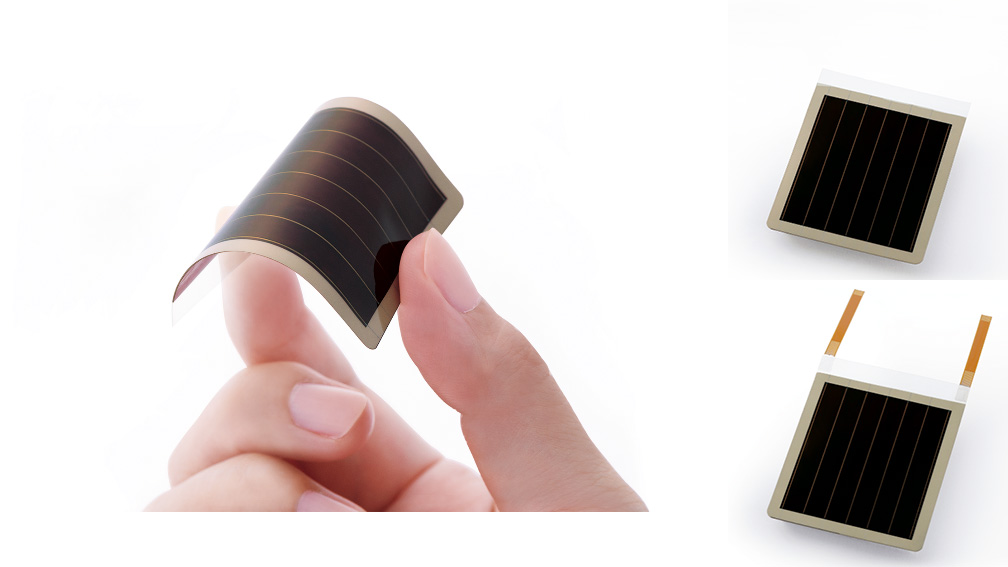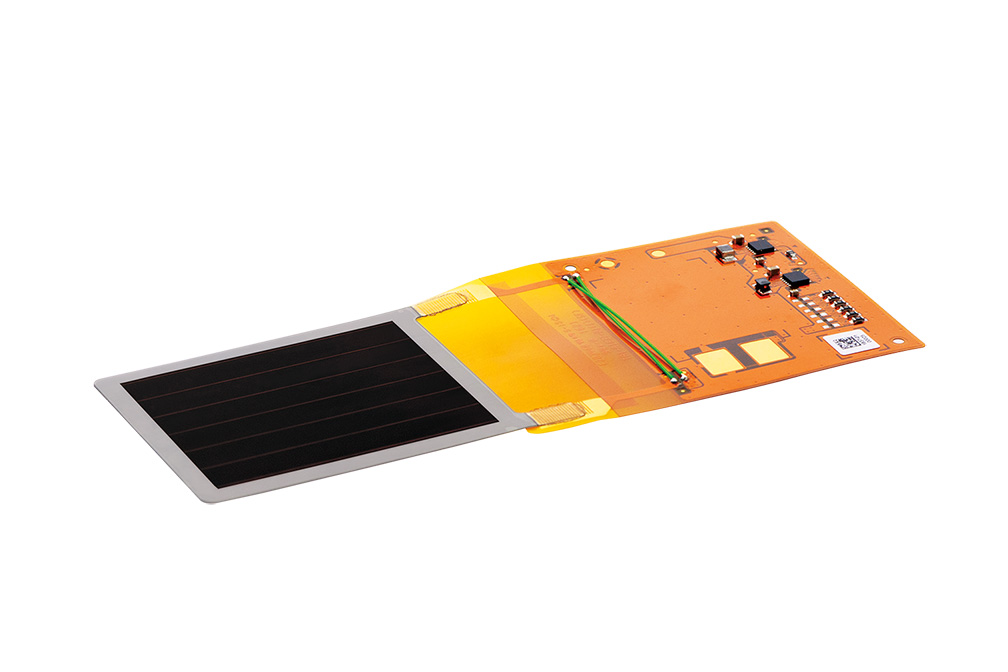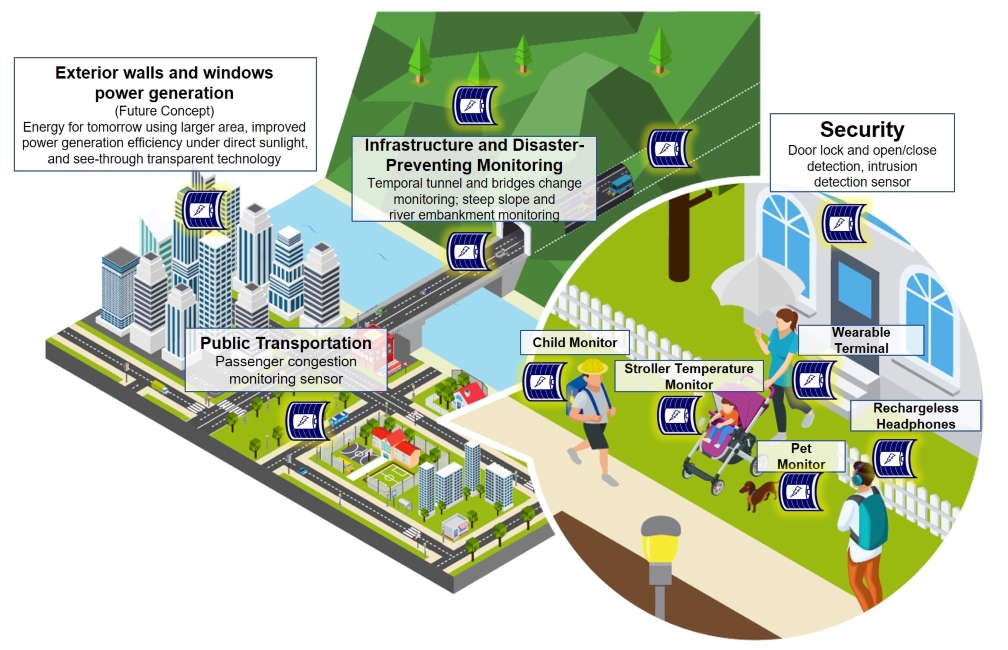Ricoh to offer flexible environmental power generating device samples for the second phase of “A World Without Charging”
Ricoh and Kyushu University jointly develop a thin, light, bendable organic photovoltaic (OPV)
TOKYO, August 18, 2021 – The demand for the Internet of Things (IoT) is on the rise throughout society. Now, Ricoh’s flexible energy harvesting device efficiently generates power indoors or in shaded areas as a stand-alone power source for the constant operation of a variety of sensors. In September, Ricoh will start sample shipments of these devices.
The flexible energy harvesting device, sized 41mm by 47mm, uses a unique power generation organic photovoltaic (OPV) material developed jointly from 2013 in an industry-academia collaboration with Kyushu University. The result is efficient power generation in low-light environment, such as indoors (approximately 200 lx), and medium-light such as shaded outdoor areas (approximately 10,000 lx). In addition, the thin, lightweight, and bendable film can be mounted on IoT devices of various shapes.
These devices can be used as stand-alone power sources for mobile and portable wearable terminals, beacons, and is ideal for social infrastructure monitoring devices, such as ones installed in tunnels and under bridges. This will make it unnecessary to replace batteries in a wide variety of small consumer electronic devices, which is expected to improve convenience and contribute to the Sustainable Development Goal “Affordable and Clean Energy”. Since the release of solid-state dye-sensitized solar cells (DSSC) for indoor use in 2020, Ricoh aims to expand its product lineup as soon as possible by providing samples to IoT device manufacturers, service providers, and trading companies as the next environmental power generation device.
Kyushu University and Ricoh will continue to collaborate on research and development* to achieve even higher output and durability.
* This research and development have been supported by JST’s “Adaptable and Seamless Technology transfer Program through target-driven R&D (A-STEP)” “Functional Innovation and Practical Technology Development of Organic Energy Harvesting Devices.”
 The jointly-developed flexible energy harvesting device
The jointly-developed flexible energy harvesting device Example of the connection to a flexible power supply board
Example of the connection to a flexible power supply board
 Image of a world without recharging and with flexible eco-powered devices
Image of a world without recharging and with flexible eco-powered devicesComments by Professor Takuma Yasuda, Inamori Frontier Research Center, Kyushu University
Energy harvesting is a future-oriented energy technology that supports our future IoT society through advanced use of environmental “ambient light.” We have been advancing energy harvesting research with Ricoh since 2013. The developed organic materials differ from conventional solar cell materials in that they exhibit excellent power generation performance even in indoor environments. The devices using these organic materials are as thin, light as paper, can be bent, and can generate power anytime and anywhere, even under dim-light conditions. This new energy technology is also expected to be widely implemented as a distributed and independent power source for various small electronic devices around us. We thus believe that this new energy technology will significantly contribute to achieving the SDG goal of “Affordable and Clean Energy”. Through the joint industry-academia project A-STEP, we will continue to promote further research and development of energy harvesting technologies that will contribute to our future society through close industry-government-academia collaboration.
Comments from Tetsuya Tanaka, General Manager, EH Business Center, RICOH Futures BU
Our future is to create “A World Without Charging”. We hope to realize a world where people do not have to consciously recharge or replace their batteries.
The Internet of Things (IoT) brings the power of the internet beyond standard computers or smartphones to a wide range of objects. Data from sensors attached to those objects can be collected and uploaded to the internet. The data can be used to monitor environments or object locations wirelessly, without the need for batteries. The use of sensors is expected to increase in the future. Energy harvesting technologies using light, heat, vibration, etc., are attracting wide-spread attention as an effective, and efficient, power source that can power sensors continuously.
Ricoh strives to realize a sustainable society and launched solid-state dye-sensitized solar cells (DSSC) in 2020. Now, we will be shipping samples of organic photovoltaic (OPV). We are also working on developing perovskite solar cells for the outdoors and even in space. We will continue to contribute to solving social issues through our business by expanding the applications of independent power sources to reduce the environmental impact through the growth of clean energy technology.
Related News
- Launch of new RICOH EH DSSC modules with 20% increase in power generation
- Ricoh launches the world’s first solid-state dye-sensitized solar cell modules
News release in PDF format
For Media Inquiries
International Public Relations Section
Public Relations Office, Kyushu University
TEL: +81-92-802-2134
E-mail: [email protected]
Public Relations Department, Ricoh Company, Ltd.
E-mail: [email protected]
For Organic Photovoltaic (OPV) Inquiries
Energy Harvesting Business Center, RICOH Futures BU, Ricoh Company, Ltd.
Inquiry Form: Link
E-mail: [email protected]
For Research-related Inquiries
Takuma Yasuda, Professor
Inamori Frontier Research Center, Kyushu University
E-mail: [email protected]
About Kyushu University
Founded in 1911, Kyushu University is one of Japan's leading research-oriented national universities with 12 undergraduate schools, 18 graduate schools, 17 faculties, 5 research institutes, a university hospital, and over 50 affiliated research centers. Home to around 19,000 students and 8,000 faculty and staff, Kyushu U's world-class research centers cover a wide range of study areas and research fields, from the humanities and arts to engineering and medical sciences. With an international student population of around 2,300, representing over 90 countries and regions, the university is steadfast in its commitment to internationalization. Our campuses--including the largest in Japan--are located throughout beautiful Fukuoka City, a coastal metropolis on the southwestern Japanese island of Kyushu frequently ranked among the world's most livable cities and historically known as a gateway to Asia.
This year, Kyushu University celebrates its 110th anniversary. Inheriting the wisdom nurtured by its history and tradition, Kyushu University will continue to attract world-class researchers and talent for the next 100 years, aiming to be a university that leads the creation of innovation.
For further information, please visit https://www.kyushu-u.ac.jp/en/
About Ricoh
Ricoh is empowering digital workplaces using innovative technologies and services that enable individuals to work smarter from anywhere.
With cultivated knowledge and organizational capabilities nurtured over its 85-years history, Ricoh is a leading provider of digital services and information management, and print and imaging solutions designed to support digital transformation and optimize business performance.
Headquartered in Tokyo, Ricoh Group has major operations throughout the world and its products and services now reach customers in approximately 200 countries and regions. In the financial year ended March 2021, Ricoh Group had worldwide sales of 1,682 billion yen (approx. 15.1 billion USD).
For further information, please visit www.ricoh.com
News & Events
Keep up to date
-
26 Feb
Ricoh named a Leader for the third time in Worldwide High-Speed Inkjet by IDC MarketScape
-
25 Feb
Ricoh selected as a member of the Sustainability Yearbook 2026 by S&P Global
-
04 Feb
Ricoh and Global Vision Multimedia Launch Strategic Partnership Negotiation in the Asia-Pacific region
-
02 Feb
Ricoh named a Clarivate Top 100 Global Innovator 2026
